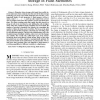Free Online Productivity Tools
i2Speak
i2Symbol
i2OCR
iTex2Img
iWeb2Print
iWeb2Shot
i2Type
iPdf2Split
iPdf2Merge
i2Bopomofo
i2Arabic
i2Style
i2Image
i2PDF
iLatex2Rtf
Sci2ools
TIT
2010
2010
Rewriting codes for joint information storage in flash memories
Abstract--Memories whose storage cells transit irreversibly between states have been common since the start of the data storage technology. In recent years, flash memories have become a very important family of such memories. A flash memory cell has q states--state 0; 1; . . . ; q 0 1--and can only transit from a lower state to a higher state before the expensive erasure operation takes place. We study rewriting codes that enable the data stored in a group of cells to be rewritten by only shifting the cells to higher states. Since the considered state transitions are irreversible, the number of rewrites is bounded. Our objective is to maximize the number of times the data can be rewritten. We focus on the joint storage of data in flash memories, and study two rewriting codes for two different scenarios. The first code, called floating code, is for the joint storage of multiple variables, where every rewrite changes one variable. The second code, called buffer code, is for remembering t...
Education | Flash Memories | Joint Storage | Memories | TIT 2010 |
| Added | 22 May 2011 |
| Updated | 22 May 2011 |
| Type | Journal |
| Year | 2010 |
| Where | TIT |
| Authors | Anxiao Jiang, Vasken Bohossian, Jehoshua Bruck |
Comments (0)

